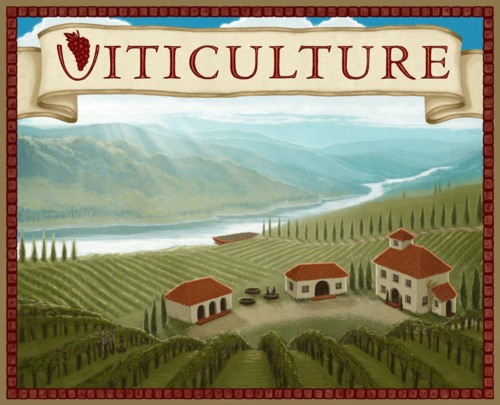Viticulture—A Double-Take Review
/"Beer is made by men, wine by God." ~Martin Luther
Today's review is for the super-hot game Viticulture, designed by Jamey Stegmaier and Alan Stone. Viticulture is a worker-placement game where you're running a winery, and trying to run yours better than your opponents. Does it succeed, or are these sour grapes? Let's find out!
Components
118 cards (small, Ticket To Ride sized)
- 42 green vine cards (These have various types of grapes on them, and various values of grapes. Some have prerequisites that require you to build a certain building before planting in your fields.)
- 36 purple wine order cards (These cards are simply asking for a certain value of a certain wine [or wines], and if you fulfill that order you'll get a reward—generally VPs and some money.)
- 20 yellow summer visitor cards (These are "personalities" who are visiting your vineyard and allow you to do cool things when you play. They might increase your VPs, or let you draw cards, or get extra money when you sell. They're quite varied.)
- 20 blue winter visitor cards (Same as above, except you'll play these in the Winter rather than Summer.)
1 double-sided game board
6 double-sided player boards
The boards are each identical on either side, except that one side has descriptions for each of the things on the board, and the other side doesn't. So if you play this enough to know by heart what the spaces do, you can choose to play on the more aesthetically pleasing side. This is a cool idea—and one of the many examples of Viticulture going above-and-beyond for its players.
36 wooden meeples in six different colors—plus one gray temporary meeple
60 glass beads that track grapes and wine
6 player order pieces, shaped like roosters
6 victory point tokens, shaped like a cork
6 residual payment tracking tokens, shaped like win bottles
1 first-player token, shaped like a bunch of grapes
8 wooden tokens for each player that represent the buildings you can build. Each of these is a unique shape as well.
Punchboard money in various denominations
As you can see, the unique pieces are another nice touch. Stonemaier Games could have made these generic pieces, but they're wonderfully crafted and evocative.
Setup
Everyone takes all of the pieces in his or her color, and a player board. Put each player's rooster near the Wake-Up Chart, the cork on the Start space of the VP track, and the wine bottle token in the center of the Residual Payment Tracker.
Each player starts with $3, a pinot card from the Vine deck, a random card from the yellow Summer Visitor cards, and three of the six workers.
Randomly determine a start player. (The game says the oldest player goes first, but we can all agree those kind of arbitrary start-player-determiners are garbage, right?)
Everything is public information—other than cards in hand.
Gameplay
The game goes through a series of years—starting in the Spring, then Summer, Fall, and Winter. As soon as a player reaches 20 VPs, the game is played through that year, and whoever has the most VPs wins the game!
Spring
The only thing you do in Spring is determine when your workers will "wake up"—but it's one of the most important things in the whole game. There are seven spots for turn order, regardless of the number of players. The start player places his or her rooster on a spot, and the other players follow in clockwise order—only one player can be on each space.
1: No bonus (other than going first)
2: Draw a green Vine card
3: Draw a purple Wine Order card
4: Gain $1
5: Draw either a yellow or blue Visitor card
6: Gain 1 VP
7: Gain the use of the gray temporary worker for that year.
Summer
Once you determine turn order, you place your workers, one at a time in turn order. One interesting thing is that there are two phases where you're placing down workers—Summer and Winter—and you don't pick up your workers between those seasons like you would in many worker placement games. The three workers you start out with are all you get for the whole year. So you might want to play just one in the Summer and then pass, because you want to play two in the Winter.
Each spot on the board has three spaces. You play with only the lefthand one in a 2-player game, the left and middle one for 3-4 players, and all three in a 5-6-player game. The middle space of every spot has a Bonus action that gives the person who plays there something extra. This space is open in games of 3 or more.
If a player can't actually perform the Bonus action (if she only has one green Vine card in hand, for instance), he or she must leave that Bonus space open, unless it's the only one left—you can't purposefully block someone out.
Let's go over the Summer spots:
Play One Summer Visitor Card: Play a card, take the action, and discard the card. Bonus: Play an additional yellow card.
Draw One Vine Card: Draw a green Vine card. Bonus: Draw two Vine cards.
Sell Grapes: If a player has grapes on his crush pad on his player board (from the Winter action Harvest), he may sell any number of them. The prices range from $1-3, depending on the value of the grape. Bonus: Gain a VP.
Plant One Vine: Plant one Vine card from your hand into one of the three fields on your player board. Bonus: Plant an additional Vine card.
Frequently Forgotten Rule!! There are three fields on each player's card, and each field has a limit of six. You can have red and white grapes in the same field, but the value of all grapes can never exceed six.
Give a Vineyard Tour: Gain $2. Bonus: Gain an additional $1.
Build One Structure: You may build one structure on your player board—after paying the structure's cost. Bonus: The structure costs $1 less.
Players continue placing workers down and taking the action, until everyone has passed. Then you move to Fall...
Fall
You invite people to visit your vineyard! So in turn order, each person draws either a yellow Summer Visitor card or a blue Winter Visitor card. This is free, and doesn't cost a worker.
Winter
Winter offers a whole slew of new spots to perform actions.
Draw One Wine Order Card: Draw a purple Wine Order Card. Bonus: You draw an additional purple card.
Play One Winter Visitor Card: Play a card, take the action, and discard the card. Bonus: Play an additional blue card.
Harvest One Field: Harvest all grapes from one field, and place grape tokens on the corresponding places on your crush pad. Bonus: You harvest two fields rather than just one.
Crush Grapes: You're using some of your grapes from your crush pad to make wine of any one variety. Bonus: Each wine you make will be +1 value higher.
For example, you would crush a 3 red grape into a 3 red wine. To make a blush, you combine one white and one red grape. And to make a sparkling wine, you combine two red grapes and one white grape. You can make more than one of the same type of wine, but you can't combine, say, a 2 and a 4 white grape to make a 6 wine; you would simply make one 2 and one 4 wine.
You also have to have room in your cellar for the wine, and blushes have to be of value of at least 4, so you have to have a medium cellar, and sparkling wines have to be of value of at least 7, so you have to have a large cellar.
Fill One Wine Order: You simply play a wine card and turn in what the wine order wants. The reward is generally VPs, and you sometimes move up on the Residual Payment Tracker, which will get you extra money every round. Bonus: You get an extra VP.
Train A Worker: This is how you get more workers in this worker placement game. You pay $4 and you get a worker for the next year. Bonus: You pay $1 less.
Hire Out Extra Workers: This action is available during both Summer and Winter, and is basically what you do when you don't have anything else to do. You get $1 for every worker you put there, and there are no limits to the number of workers you and other players can place here.
Year End
At the end of each year you:
Age grape and wine tokens. Only one token per space, and only if you have room and an appropriate cellar, so sometimes grapes and wine have to just stay put. Otherwise they more one space forward.
Return workers to players.
Collect payments from the Residual Payment Tracker.
Discard down to 7 cards.
Rotate the first player counter-clockwise, and that person will begin placing during the Spring action on the next turn.
When a player reaches 20 VPs, you play that current year through, and the player who ends up with the most VPs wins!
There is an expansion available, though neither of us have had a chance to play with it yet. I (Firestone) did add the expansion's Grande Workers to one game. Each person gets one Grande Worker, and if you place that worker in a regular spot, he still gets the bonus action as though placed in the bonus spot—even in a 2-player game. Since each person only got one, it didn't throw the game out of whack, and added an interesting other layer to think about. I see no reason not to add the Grande Workers to every game I play.
Recommendations
Youth group/party game?Probably not! There is so much depth to this game that it doesn't feel like a group or party game. It plays 6, but they had better be invested in the experience. I do know one of the designers' intentions was that this would be a game you could play with other couples (possibly over a glass or two of wine), but this feels deeper than most couples I know could handle.
Family game?Possibly! Family game isn't the first description that springs to mind. But if your family likes meaty games at all, this is one to look out for!
Gamers' game?Definitely! This is the game's sweet spot. It's deep and thinky and definitely for gamers.
The Verdict
Firestone—I really, really like this game. The worker-placement genre has produced some really terrific games, and I place this one up there near the best of them. It's no Tzolk'in or Pillars of the Earth, but it's definitely in the top tier for me.
Jeremiah—Yeah, I'll jump on board with that. There are a lot of popular worker-placement games out there; my game group has been big fans of Stone Age lately, and let me tell you: I'll choose to play this before Stone Age every time. To me worker-placement is all about out-thinking the game and your opponents; with no dice involved, Viticulture allows the players to compete with each other, not the luck of the dice.
Firestone—My first favorite thing: The designers have blatantly ripped off the "waking up" mechanism from Fresco—and I'm SO glad they did! It was the only part of Fresco I actually liked, so it's wonderful to see a great mechanism used in a better game.
Jeremiah—Race for the Galaxy has a similar "turn order" mechanic; this ties in nearly perfectly with the theme... There's nothing new under the sun.
Firestone—One of the first criticisms I heard about this game was that it's possible to win without ever filling wine orders. The person said the game was broken because the "point of a game about winemaking should be to make wine!" Which is, of course, ridiculous: The point of a game about anything is to win! The fact that there's more than one way to gain VPs means that there are multiple paths to victory. One way may be better, and it may all be situational, but I thought that was a narrow view to take.
Jeremiah—I can understand the thinking behind the complaint—it is, after all, a game about making wine. But having a winery involves much more than the actual making of the vine. It is a business, and there are definitely multiple ways for businesses to achieve success. And from a gameplay point of view, you may have to, in fact, go through a year or two without being able to plant/harvest vines, crush grapes, etc. (due to your turn order, or a bad decision of where you placed workers that year). Having options to still scrape together some VPs doesn't break a game; it keeps it interesting for the players who got blocked out of a needed action that year. It's called balance...
Firestone—This is an efficiency game: You have to play lean and mean. If you end up with too much money, or too many workers, you had an inefficient vineyard, and you probably lost. And I love how you have to be nimble and have a somewhat-fluid strategy. For example, you have to be more aggressive on the wake-up track depending on whether you're playing with even or odd numbers of players, because of the number of spaces available. Spaces I thought were useless in my first games, have grown on me as I've seen them used well by other people. I love that.
I've played games with as few as three players and as many as six, and it scaled really well. The designers stated that was a goal, and I completely think they hit it. Now, the game is longer with more players, simply because more people means more people making decisions which makes for a longer game—so I'm not anxious to play with six players again, but mechanically it works fine with more players.
Jeremiah—So what you're saying is...Your strategy is always in "Fluxx"?? Anyway, I agree: Thinking on your feet is a big factor because of the limited spaces available for each specific action. I think that's what I enjoy about worker placement: There's an element of pushing your luck, or bluffing your opponents to think that you're not going for a certain action when in fact you REALLY want it, and you have to sweat it out until it's your turn. (Because, of course, you selected a sweet bonus on the wake up track...)
Firestone—My only complaint about the game is the cards. The powers vary—sometimes wildly—and it's highly situational. I have drawn cards that were utterly useless to me and the way my winery was currently situated. Then an opponent would draw a card that fit perfectly with what he was doing, and he could gain some VPs with now-minimal effort. That bugs me, and I feel like, given how much I dislike the cards, I shouldn't like this game as much as I do. But I still do.
Jeremiah—I often tell people that the only randomness/chaos present in the game is the card draw. It's part of the game. I look at it as, well, if I had a winery doing ABC, and a customer showed up looking for DEF, I would be out of luck. Maybe a secondary condition worth a lesser value of points would have been a fix (simulating your ability to sell them a product or experience that they weren't looking for), but I wasn't terribly bothered by the function of the cards themselves... Now, if you want to talk about the SIZE of the cards, I will always, and forever have a beef with any game that gives me little mini-cards to hold. Yes, I understand they need to fit on the board because of aesthetics, blah, blah, blah. I don't like them. It's a "thing."
Beyond the size of the card "thing," the components are nothing short of fantastic. They could have easily given a bunch of workers, and a bunch of generic tokens, but instead there are a plethora of individual structure meeples, Stonemaier even included Viticulture-themed coasters. Completely unnecessary, but a very nice touch to find those in the box.
Firestone—I agree: The components are amazing. Each and every structure has a unique sculpt—even the two different cellars are slightly different sizes! The roosters are cool. The meeples look great. The money is tokens rather than paper money (yay!). And the wine/grape tokens look great, too.
Jeremiah Final Thoughts—There are a few of my good gamer friends who still haven't played this with me, and probably at this moment don't believe the hype. And that's because I have hyped it a TON lately. Viticulture has taken a theme that I, honestly, am not usually too excited about, and created a game that is fantastic, and has me clamoring to play any time it is mentioned. Well done!
Firestone Final Thoughts—This game is a textbook example of how to design a game and run a Kickstarter campaign. The guys at Stonemaier listened to players, thought through decisions, underpromised and overdelivered, went the extra mile on components, and—most importantly—created a fun game! I've played Viticulture a number of times, and it's still going into my game tub for game night tonight. It should be at your game nights, too.
Theology Of Games would like to thank Stonemaier Games for providing review copies of Viticulture. This in no way affected our opinions of the game.


















